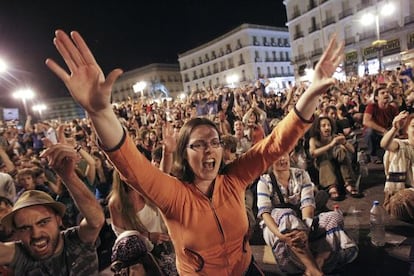Waiting for Spain’s Beppe Grillo
Discontent is rife, but no one seems willing to front the protest movement


Weariness. Despair. Indignation. Such is the mood in Spanish society. The joblessness, spending cuts and corruption have opened up a growing rift between citizens and the politicians who are theoretically there to defend their interests. Like the hurt party in a couple mid-divorce, voters have stopped trusting their representatives, whom they blame for their own problems.
In such a scenario, surely it would not be utterly impossible for a third force to suddenly emerge on the political scene - a guide that would bring renewed hope to the hopeless while cashing in on the crisis between the political class and civil society. Yet so far at least, there is no sign in Spain of anything like Beppe Grillo, the histrionic Italian comedian who has managed to attract many discontented voters to his populist Five Star Movement.
In Spain, millions of people have marched to protest over just about everything, but nobody is willing to become the visible face of discontent - not even Ada Colau, spokeswoman of the Mortgage Victims Platform (PAH) anti-eviction campaign group. Colau is perhaps the best-known representative of popular indignation after her impassioned speech in Congress made the ruling Popular Party (PP) change its mind and accept debating a popular initiative seeking legislative changes that would allow defaulting homeowners to turn in the house keys without remaining indebted to the bank.
"It is this expired system that is shooting itself in the foot," says Colau, rejecting any notion of spearheading a generalized protest. "Things are going to happen, and I don't know whether a Grillo will emerge here; there is certainly a breeding ground for it. But it won't be me. I only accepted my share of visibility at a specific point in time."
Things are going to happen; there is a breeding ground for it. But it won't be me"
This aversion to the limelight was equally evident during a telephone interview with a spokeswoman for Partido X, a party that evolved from the 15-M grassroots movement that organized massive sit-ins at Madrid's emblematic Sol square in 2011. The person on the other side of the line explained that she would only speak on condition of anonymity.
Although they will admit to certain similarities with the Five Star Movement ("we are not politicians, we are citizens working for citizens"), Partido X is both "pleased and concerned" by the rise of Giuseppe Grillo, said the spokeswoman. "It is the logical result of a divorce between civil society and our ruling elites, who are out of touch with reality. But there is a risk associated with focusing on one person. Grillo says outrageous things. People have to stop delegating to specific figures, and instead exercise constant control. We are not children who depend on Daddy."
Such iconoclastic sentiment is remarkable in a country that periodically sees the emergence of a leader with enough followers to lend his own name to his political party: Agrupación de Electores Ruiz Mateos (a famous businessman currently charged with fraud), Grupo Independiente Liberal (the initials for the notoriously corrupt Jesús Gil y Gil, who became mayor of Marbella) and more recently Foro Asturias Ciudadano (named for the former PP politician Francisco Álvarez Cascos, who made it to premier of Asturias).
"In Spain we are vaccinated against the rise of anti-system characters like Grillo," says Juan José Toharia, head of the polling company Metroscopia. "There's one thing you learn from conducting surveys, and it is that we are an extremely sensible and civic country. No matter how pissed off we are, when elections come around common sense takes over. The democratic transition is still fresh in our minds, and people express nostalgia for that old spirit of dialogue; they also show weariness of this constant cock fight."
We are too civic and sensible. Elections come around and common sense takes over"
The Socialist Josep Borrell, a former minister who recently presided the European University Institute in Florence, does not believe there is a latent Grillo in Spain, either.
"In Italy, voter disaffection and corruption have been around for a great many years, and all that has gelled into [support for] a face that is leading an organization. In Spain, such a climate of disaffection is more recent, and it is the economic crisis that aroused the rage. What we have here is basically a psychiatric, visceral kind of release. The street demonstrations are just that: a mere expression of democratic passion. What is perhaps missing is a face, a leader, and the organizational capacity to articulate an alternative."
"I don't know whether we have a Grillo here -- he strikes me as a dangerous character who says outrageous things yet nobody makes him pay for them- but what we do have is a grillado [madman] or two, and therein lies the risk," says the philosopher Fernando Savater, making a pun on the Italian satirist's name.
Regardless of voter disaffection, however, politics is a hot topic these days. Each and every public incident releases a torrent of comments on Twitter. Debate programs have suddenly become prime-time material. One particularly popular program is El intermedio, a satirical newscast hosted by José Miguel Monzón, a seasoned comedian better known as El Gran Wyoming. But Monzón will not hear of comparisons with Beppe Grillo. "It seems like pure demagoguery to me," he says. "To tell everyone to go to hell, to say that the left and the right are the same thing -- all this gives you an idea of his level. I am not in the least bit interested."
Tu suscripción se está usando en otro dispositivo
¿Quieres añadir otro usuario a tu suscripción?
Si continúas leyendo en este dispositivo, no se podrá leer en el otro.
FlechaTu suscripción se está usando en otro dispositivo y solo puedes acceder a EL PAÍS desde un dispositivo a la vez.
Si quieres compartir tu cuenta, cambia tu suscripción a la modalidad Premium, así podrás añadir otro usuario. Cada uno accederá con su propia cuenta de email, lo que os permitirá personalizar vuestra experiencia en EL PAÍS.
¿Tienes una suscripción de empresa? Accede aquí para contratar más cuentas.
En el caso de no saber quién está usando tu cuenta, te recomendamos cambiar tu contraseña aquí.
Si decides continuar compartiendo tu cuenta, este mensaje se mostrará en tu dispositivo y en el de la otra persona que está usando tu cuenta de forma indefinida, afectando a tu experiencia de lectura. Puedes consultar aquí los términos y condiciones de la suscripción digital.








































